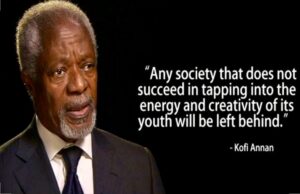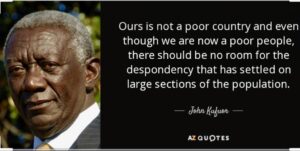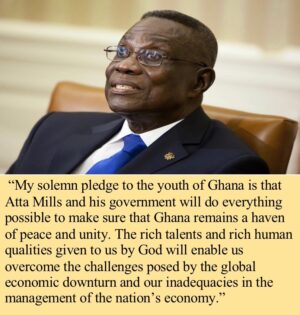Knock knock jokes, like the topic regarding this article, are pretty much unfunny—interesting maybe, but not funny. So it is perhaps fitting that I chose them to help make sense of this mess I have been witnessing for so long now—and perhaps you have too.
It seems like we are trying to build, for ourselves, a country. That is what the constant up and downs, our individual coming and goings, the campaigning, the voting, and the subsequent election of leaders—are all for, right? This all is to eventually help build for us a prosperous, developed nation, isn’t it? If not then what is the point? Interestingly, this is where I find knock knock jokes ringing a bell. I say knock knock; you say, who’s there?
“Knock knock.”
“Who’s there?”
“Nana”
“Nana Who?” “
“Nana your business”
‘None of your business!’—this is how this supposed consensus nation building thing feels like to me. The call on the citizenry to ‘be citizens, not spectators’—this, giving form to the numerous implications by past governments, not just the incumbent, that the Ghanaian citizen is unperturbed, nonchalant; that the Ghanaian has a ‘government-must-do-all mentality’. These are things we, as citizens, have had hammered on us—for so long, so much so that, we have grown inured to them, accepted them as true, and perhaps repeated these insults on ourselves. But this is far, far from the truth. Think about it: far, far from the truth.

A Series of Complaints by Dismissed Helps, and Kafka’s Poseidon
I have sat through a number of government-held conferences, and have always found the Q&A sessions very enthralling—they are the reason why I attend these programmes in the first place. I have with me a number of recordings, of rants by various vibrant Ghanaian men and women, each chronicling their experiences with our governments. Experiences of dismissals, disrespect, outright rejection just because they dared seek a meeting with this minister, that civil servant—intending to propose to them, what they believe to be, groundbreaking proposals intended to spur national growth.
These, they believe to be their individual quota to our nation building journey. And me, sitting there, I am always pissed—being part of these dismissed helps; dismissed by Kafka’s Poseidon, our governments—always seeking help, always complaining of being swamped, being unassisted, but rejecting it when helping hands are brought.
See, if you have been in this position before, then you know just how it feels. The impression of: “This whole nation building process…it is none of your business!” is conveyed to the proactive citizen (intending to shake themselves off spectatorship) each and every passing day. Be spectators, not citizens—that is more like it.
At one particular conference, the frustrations of the ‘citizen’ Ghanaian had reached its peak, it seems. A woman farmer/inventor brought the house down when she railed representatives of our government. Close to tears, she related the number of times she had sort a meeting with this minister, and that minister, to no avail.
A woman owning a 50,000 poultry/ 600 pig farm. A woman who makes propiti

ous use of everything on her farm: excrements for manure, biogas; pigs hair for false eyelashes; pigs fat for lipsticks, etc. She said it: “Nothing on my farm is wasted!” A woman with the potential to massively impact a wide array of fields, from energy, food and agriculture, industry, all through to cosmetics; with the potential of building a conglomerate capable of hiring a bunch load of people from across numerous sectors. This woman just wanted a meeting with a minister, to showcase this biogas technology of hers.
To keep her quiet perhaps, the chairman of the session hands me a business card to pass to her. Another stalling tactic—like she didn’t already know how to get to him! She was never going to get that meeting, we all present knew—and even if she did, it would amount to nothing.
Now, you may point out this: that it is perhaps because she was a farmer—hence her difficulty getting someone to take her seriously. And by mentioning this, you call to attention, another incredibly disturbing canker in our thinking, but that is a topic for another day. However, I have come to find that these rejections cut across professions, sectors. So long as one is: a) Ghanaian; b) Black, one stands a great deal of chance of being overlooked. This may be the case of a prophet not being respected in their own home—except in the case of us Black folks, not respected everywhere.
There is this Ghanaian professor based in the UK. A diaspora, an innovator, having developed a system to help ease the burden of providing potable drinking water to communities, thought to himself: ‘Let me go to my country Ghana, to contribute my part towards change.’ Needless to say, he sent his inventiveness all the way back to his host country, having failed to secure an audience with policymakers.
This gentleman, I know, developed a project to help build a robust e-learning system in our universities. I have to ask him which juju man he visited who foretold to him, an impending pandemic, because this project of his would have been a ready and working solution to the social distancing the coronavirus has necessitated. Having chased policymakers for years to no end, this dream, this transformative project may just come to nothing.
I had this landlord some years ago, a borga, a ‘poor man’s son’ he called himself who

came back to his country with a vision. Let me directly quote him on this: “I cannot understand why, a village boy like me, had to smuggle my way into someone else’s country to be ‘made’. I find it silly that my own country couldn’t ‘make’ me; it had to take someone else’s. I find it even harder to swallow that upon return, I am met with numerous, robust walls of resistance against my plans of contributing my quota to the nation’s growth; that to be helpful I need, sometimes, be corrupt—be required to pay bribes here and there.” Do I need mention that he too borga-ed his way back to his host country, his ‘I have a dream’ speech never heard?
As I sit limply through this same conference, exhausted by the countless experiences related, very similar to my own, I check my notes, specifically, a section I have titled ‘Ministries’. There, I have categorised, the various Ministries whose supports I would need to make a certain project successful. In retrospect, I find it all very funny to me—the childlike trust I had, that something as propitious as this would get a listening ear—eventually. Silly me. Even though reading on, I see the number of months it took, navigating endless bureaucracies; each promise of ‘come next week’ I had, I believed in, and followed through, only to be met with another: ‘come next week’. Eventually out of the intended seven ministers, I did meet just three. I was to relate this to a colleague later, only for him to exclaim: “Wow! You’re so lucky; how did you do that?!”
So there you have it: I am Yao Afra Yao, the Ghanaian citizen with a dream who was able to meet 3 out of 7 policymakers to discuss a proposal for national development. Apparently ‘lucky’. Nice to meet you. What is your number?
Not one Government’s Problem & the Politics Card
So many deep-seated problems stifling the Ghanaian development journey are constantly being overlooked with our tendency to pull the ‘politics card’. So much so that, you an NDC supporter, reading on, may be cheering me on saying: ‘Yes! Those corrupt people are running the country down’; and you the NPP supporter—well, you are mad as an elephant can be, at what may be perceived as gibes directed at your political party. Both of you…chill. Let’s ease off with a joke.

Knock knock.
Who’s there?
Candice.
Candice who?
Candice door open or what?
No, this Ghanaian door cannot open—we close doors on our own selves a lot! This is not God’s doing—it is not a biological flaw for us—a people, Ghanaians, Africans, Black men and women—to belittle each other. We see potentials everywhere but in our own selves. This is a sociological problem, I have come to find—finding roots in slavery perhaps. For so long, we had been told by a group of pale-looking people that it is they who hold the secrets to unlocking the world’s goodness; that it is only they who can spearhead our world into better days. We, we have been just tag-alongs for so long.
Sold into slavery, forced into colonialism, forced out of our culture, our own way of thinking, that the world as we know it now, even though we are technically citizens of it, we really are just spectators. All of us: Ghanaians, Africans, Black people, forced into spectatorship. With our gaining of independence(s) in the 20th century, it is safe to say now that presently it is we, who are, with our very own hands, forcing our own selves into spectatorship.
That is why this professor friend of mine got no one to take him seriously. A Ghanaian? Invented a machine to ease the well/borehole drilling process? Tofiakwa! A Ghanaian woman, invented biogas digester? Kai! This person, sitting here writing, a Ghanaian, has created a project to help build university/industry partnerships towards driving our industrialisation journey? Apuu!
The Unsuccessful Braggarts
We still brag about, and leverage our natural resources as our main points of contribution, to the global community—as though we created them—but our human resources, not so much. Yet, that is one damning contributive factor to any nation’s bad/under performance. The inability to utilise its human resources to transform its God-given natural resources into internationally competitive goods and services—thus placing it at a competitive and powerful place on the international plane. That is what separates a wealthy nation from a poor one.

The situation we have in our world is: some developed nations, being relatively scant on natural resources, have found means of building for themselves proactive human resource capital; they have found ways of outsmarting these purported natural-resource-rich nations (developing nations like Ghana)—mostly, by stealing from us (but, again, that is a topic for another day.)
Let’s be frank: it is shameful, our parading about with these natural resources. It is like that child born into a wealthy family, sent through the best of schools, who ends up a useless adult. It wouldn’t be precisely wise for such a person to go about telling people of his promising background, would it? Because that would be adding insult to injury, and blunt people may ask: so then why are you useless now? — after all these natural resources, why are you still struggling?”
Knock Knock
Who’s there?
Me
Me who?
Having and identity crisis, are you?
A Soliloquy
Back to the conference: this honourable (I mean this word) minister took the stage, and started having a long conversation with himself—interestingly telling us the things his own office really ought to be doing. He went to the extent of telling citizens to “put pressure on the government” to put in place policies that would make Ghana internationally competitive. His very own words! This gentleman sitting beside me, is unkind, and murmurs, ‘nonsense!’
What else did he say at all? Oh! He said—he said that we should not just focus on theoretical researches in our various universities, but applied research, those that offer practical solutions to the nation and continent’s problems. “This is the chance for our universities to assist the country…and for the private sector to invest in university research.” Those were his exact words. That was my cue—I found myself, to my dismay, also yelping: ‘nonsense!’
Who was that message directed at, specifically? As someone who has laboriously, as earlier mentioned, worked on getting such a project going, one that would help spur a culture of innovation in the nation; knowing very well the hunger of our various universities to effectively play a part in driving the nation’s industrialisation agenda through both basic/applied research, knowing full well how industries are also thirsty to make such contributions towards change, and having chased policymakers in vain; knowing well that universities are willing and ready; industries are willing and ready, the only unwilling and unready party in this: seemingly the government—I find myself still asking: who was that speech directed to? It ought to have been a soliloquy; we the audience, just unfortunate onlookers.
No nation, will ever be able to secure for itself development—employing internationally competitive tools such as industrialisation and information technology—without the government first and consistently leading by example. Universities are crippled, unable to do what this minister is requiring of them without the government methodically and constantly feeding them with funds.
Industries will, in reality, be and remain un-enticed and unenthused into partnering with universities, without the government consciously creating conducive environments that would make such partnerships work and reap national benefits. The private sector—most importantly the Ghanaian private sector, can never be able to solely carry the burden of funding research universities. The duty lies first, with the government; with the private sector providing supplementary help. This is a topic I tried covering in an article titled ‘Higher Learning; Low Expectations’. We need not go over them all over again.
He ended with an assurance to us in the audience (here is how we knew that he, in fact, hadn’t been, speaking to himself, but to us all along). He said that the government would continue to engage our “collective capacity”. And that we should feel free in reaching out to them (we have been knocking doors, they never open); that we should feel free in writing (see, I am writing); we should feel free in speaking (we have been speaking for so long). The Ghanaian citizen has done all three—what next? We can only conclude that this very distinguished man hadn’t been listening.
We clapped for him as he left the stage, as polite audience do. Many clapped harder, because they needed the noise to mask their incessant retorts of: “nonsense!” Some, rudely awoken by the sound of claps, gingerly joined in. I started clapping too, I must have dozed off myself.
It was a day of mumblings mixed with clapping. We would have, in fact, collectively shouted “tweaa”—had that not gotten one Ghana-man spectator in trouble some years ago.
You know what, I have changed my mind, these knock knock jokes are, in fact, hilarious—so is the Ghanaian journey.
Knock Knock
Who’s there?
Ghana
Ghana who?
We are Ghana try to build a country without effectively utilising our human resources—our manpower and brainpower.
Now, that is very, very funny
>>> the writer is the co-founder, Blarney Stone Inc. (BSI Africa), [email protected]. BSI Africa is an organisation that specialises in the creation of policy-initiating programmes aimed at spurring our country and continent toward economic and socio-economic development www.blarneystoneinc.com










